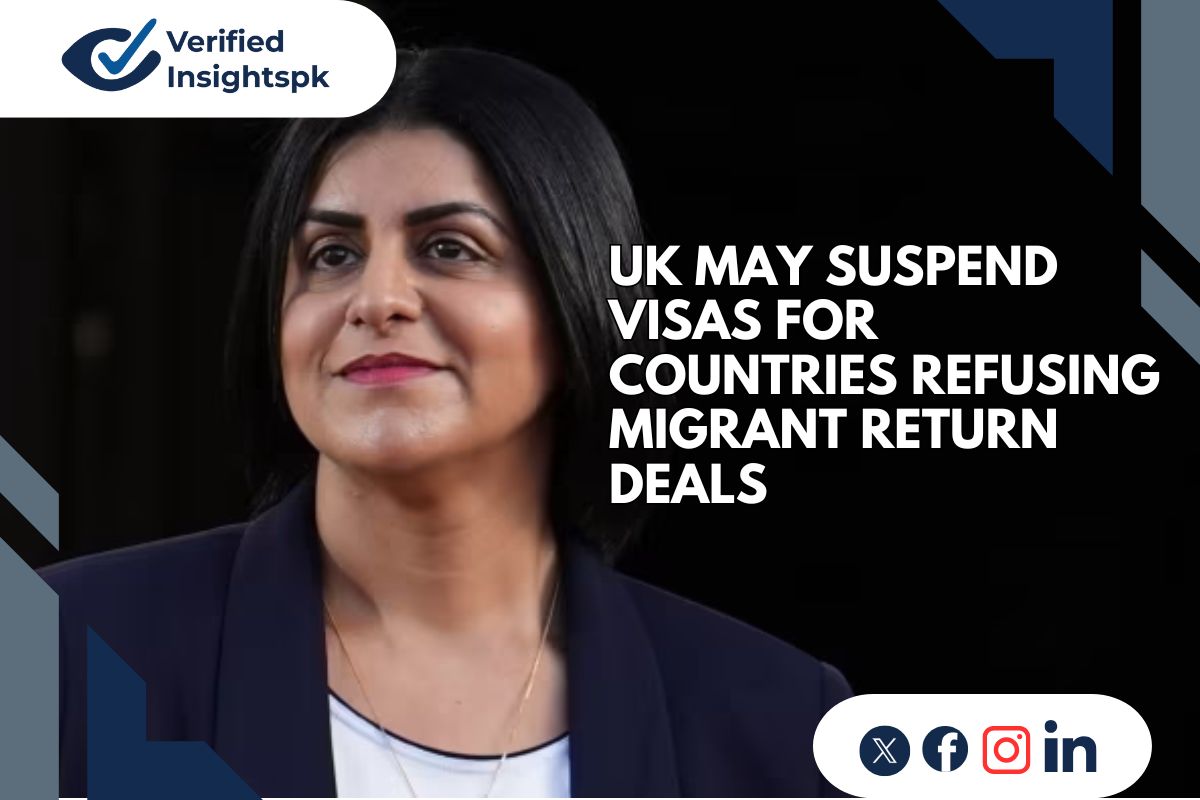
UK May Suspend Visas for Countries Refusing Migrant Return Deals
The UK government has signaled a tough new approach to illegal migration as Home Secretary Shabana Mahmood announced the possibility of suspending visas for countries that refuse to take back their citizens. Speaking at a high-level Five Eyes intelligence-sharing meeting in London, Mahmood stressed that her top priority is securing UK borders and cracking down on illegal migration, especially the growing number of small boat crossings in the English Channel.
Five Eyes Meeting Focused on Border Security
Mahmood hosted officials from the US, Canada, Australia, and New Zealand as part of the Five Eyes alliance, one of the world’s strongest intelligence-sharing partnerships. She held talks with US Homeland Security Secretary Kristi Noem, along with Canadian Minister Gary Anandasangaree, Australian Minister Tony Burke, and New Zealand’s Judith Collins.
Additionally, the ministers discussed illegal migration, border security, online child sexual abuse, and the opioid trade. Mahmood emphasized the need for joint efforts to disrupt human smugglers and improve migrant return agreements.
Visa Suspension for Countries Not “Playing Ball”
Mahmood made it clear that the UK will no longer tolerate countries that refuse to cooperate in returning failed asylum seekers. She said the government is considering a visa suspension policy for such nations, adding:
“For countries that do not play ball, we are exploring coordinated action with our Five Eyes partners. Cutting visas could be one of the measures to ensure countries meet their obligations.”
While Mahmood did not name specific countries, experts highlighted that India, Bangladesh, Pakistan, and Nepal often resist return agreements despite high demand for UK visas.
Small Boat Crossings Hit Record Levels
On her first full day in office, Mahmood faced a record number of migrant arrivals, with 1,097 people crossing the Channel in small boats on Saturday alone. This brings the total arrivals this year to over 30,000 migrants, a 37% increase compared to last year.
However, calling the situation “utterly unacceptable,” the new Home Secretary said she would take decisive steps to bring numbers down and strengthen border security.
Political Pressure and Opposition Response
Prime Minister Sir Keir Starmer has previously called for a “transactional approach” to visas, linking them directly with cooperation on asylum returns. Downing Street confirmed that the Five Eyes partnership adds “another tool in our armoury” to manage illegal migration.
However, opposition parties have criticized Labour for being slow to act. Shadow Home Secretary Chris Philp accused the government of “talking tough but not acting tough,” and called for cutting foreign aid to countries that refuse to take back their citizens.
Wider Government Plans
Alongside visa reforms, the government is also considering expanding military and non-military sites to house asylum seekers, aiming to reduce reliance on expensive hotels. Defence Secretary John Healey confirmed officials are reviewing options to relocate migrants.
Shabana Mahmood’s appointment as Home Secretary, replacing Yvette Cooper, is being seen as a strong signal that Labour wants to prioritize immigration control. With her reputation as a hardliner, Mahmood is expected to push forward with stricter measures to reduce illegal migration and ensure that failed asylum seekers are returned swiftly.
Conclusion
The possibility of a UK visa suspension policy for non-cooperative countries marks a significant shift in immigration enforcement. Mahmood’s stance reflects the government’s determination to reduce small boat crossings, strengthen border security, and hold foreign governments accountable.
As the UK faces record numbers of Channel crossings, the debate over visas, asylum returns, and border control is set to remain at the top of the national agenda.










